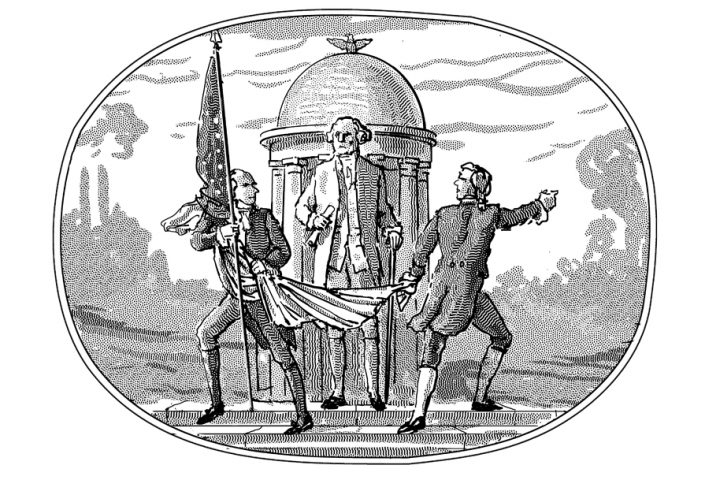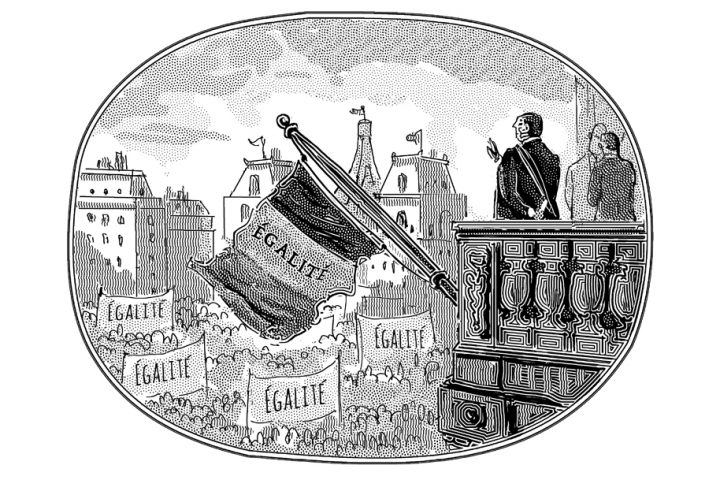Books Reviewed
Johann Wolfgang von Goethe (1749–1832) has the kind of unquestioned preeminence in the German-speaking world that Shakespeare has among English speakers. And yet a number of German-language authors are more widely read outside Germany: Franz Kafka and Thomas Mann, for example. That’s because Goethe’s standing as the colossus of German literature rests above all on his lyric poetry and his poetic drama Faust. A great lyric poet is a master of a particular language, deploying all of its resources with consummate skill—rhythms, forms, sounds, syntax, lexicon. From which it follows that the greater the poetry, the more it resists translation into another language.
Take Goethe’s poem “Um Mitternacht” (“At Midnight”). The three stanzas have a man looking at the night sky at three different stages of life: as a child, a young man, and finally in maturity. The boy sees “Stern am Sterne”: star upon star, pretty but unconnected. Simplicity both of vision and understanding is expressed in monosyllabic language. By contrast the young man sees constellations and northern lights in conflict with each other. The stars have been joined into structures, part real but part imposed as the young man projects his own conflicts onto the night scene, in polysyllabic conceptual language. The third stanza has the mature man looking at the clarity and brightness of the full moon, but to say only that would miss something, because Goethe reverts to monosyllabic language. And that gives the poem a shape and meaning it would not otherwise have: the third stanza doesn’t just complete a linear development through the three stages, because in a crucial respect it goes back to the world of the first stanza, to the simplicity and clarity of the child’s vision, but a heightened version of it. One particular feature of German that Goethe exploits is its ability to make an adjective into an abstract noun by just inflecting it as a noun: English needs a suffix to make “bright” into “brightness” but German doesn’t (hell becomes die Helle). If you translate using the English polysyllabic word you damage Goethe’s poem by making the third stanza more like the second than the first.
* * *
Poetry was part of the way Goethe thought about the events of his daily life. When something happened that raised an issue that seemed worth dwelling on, he wrote a poem about it. But on the way from the event that started things off to the finished poem something would be abstracted that would later capture the attention of people who had no interest in what happened that day. Issues had been distilled, and what emerges is inspired commentary on human life, not Goethe’s life. This lifelong habit meant that Goethe produced an enormous volume of poetry in every conceivable mood and style. There are love poems and philosophical poems, poems in down-to-earth language and poems in exalted and esoteric modes, anguished poems as well as witty or even hilariously funny ones, lengthy ballads and short lyrics, narrative poems and epics, epigrams and elegies. And in all of them, Goethe’s virtuosic command of German is central, which is why one of the world’s greatest writers is little read outside the German-speaking world.
In 1994-95 Princeton University Press sought to remedy this by publishing a series of translations by various hands: Goethe: The Collected Works in 12 Volumes. Matthew Bell, Professor of German at King’s College London, now offers the “more manageable format” of a single large (1,000 pages) volume that is in the main a selection from those Princeton translations.
* * *
The most obvious question to ask of this undertaking is: how does Bell deal with the problem of Goethe’s most important work resisting translation? Alas, he simply buries the issue. He includes only a handful of poems, so that of the 1,000 pages the poetry gets only 40. So a volume that calls itself The Essential Goethe omits most of even the most famous poems. Twice as much space is devoted to the scientific writings, three times as much to Goethe’s account of his journey to Italy. The Princeton series made a brave attempt to deal with the problem: for the poetry volume only, it gave the German original together with the translation. That was sensible. An English speaker armed with only a rudimentary grasp of German grammar and a translation can still get some sense of the impact of the original poem.
Bell ignores that solution, and in his introduction does nothing to correct the impression he has created that Goethe’s poetry is the least important part of his output. He mentions only a few poems, mostly in passing, and here too devotes more space to the scientific work than to the poetry. Any introduction to Goethe must as a first order of business discuss the scope and variety of the poetry and its extraordinary importance in German literature. There is no such discussion here.
* * *
Goethe’s novels provide easier access for an English speaker: there is Die Leiden des jungen Werther (The Sufferings of Young Werther) which made him internationally famous at age 25. There is Die Wahlverwandtschaften (Elective Affinities) which Thomas Mann thought an absolute wonder, and the preeminent German novel. And then there are Wilhelm Meisters Lehrjahre (Wilhelm Meister’s Apprenticeship) and a later sequel, both of which are much less accessible because of a rather disjointed episodic structure.
Space being limited a choice is necessary, but that choice almost makes itself: both the novel that made him famous in 1774 and the one that is commonly judged his greatest are the most accessible, and the shortest. The two combined would take up 100 pages less than just the first Meister novel. Once more, Bell’s choice is baffling: he includes Wilhelm Meisters Lehrjahre and ignores Werther and Die Wahlverwandtschaften. Why? In the case of Die Wahlverwandtschaften, Bell seems not to know that it exists. It’s absent from his chronological list of Goethe’s major works, and is never mentioned in his introduction. Werther is simply dismissed as a “sentimental novel,” without any discussion of its content or reception. But that phrase only deepens skepticism about Bell as a guide to Goethe.
On the surface, Werther is about a young man who falls in love with a woman already betrothed, Lotte, and eventually commits suicide, but a closer look reveals that it is about people who live their lives through the books they’ve read, which means that it’s not a sentimental book, but a book about sentimentality. When Werther and Lotte look out of the window at a storm she says, “Klopstock,” recalling an ode by a poet popular at the time. The scene is experienced through an indifferent poem. And when Werther commits suicide, he leaves behind an open book (Gotthold Ephraim Lessing’s Emilia Galotti) which also ends in suicide. Much to Goethe’s chagrin, some of his readers missed the point and treated this as yet one more book to live their own lives through. A spate of suicides resulted. These readers in their fundamental misunderstanding of Werther made the same mistake that Bell now makes.
* * *
Faust is Goethe’s most important single work: the noted drama critic Martin Esslin said that Goethe’s magnificent Faust is equaled only by the tragedies of William Shakespeare. The Princeton series has the excellent translation by Stuart Atkins, a great Goethe scholar with a long history of interpreting and translating Faust. But Bell rejects the Atkins translation and uses instead a much inferior one. His table of contents claims deceptively that Faust is included; only Part 1 is here. Atkins wrote a thoughtful essay on translating Faust, warning against translations that distort Goethe’s thought in order to preserve a rhyme. He might have been thinking about the translation that Bell uses.
Here is an example of the damage this can do: In the scene “Wald und Höhle” (“Forest and Cave”) Faust likens himself to a raging, destructive torrent crashing down on rocks below, while nearby Gretchen lives quietly in her cottage in a small alpine meadow. The image of the cottage is an important one that links many different scenes of Faust. In Part 2, Faust destroys the cottage (“Hütte”) of antiquity’s legendary devoted couple Philemon and Baucis—the couple he and Gretchen could never become. Faust destroys the cottage because it represents something he can never have. It is the play’s image of perfect contentment through limitation, the exact opposite of what the Lord says He wants for mankind in the play’s Prologue in Heaven. There He gives them (not just Faust) the companion (Mephisto) who gives them the itch of dissatisfaction that makes them aspire to something more, something better. Mephisto is the Lord’s agent of creative destruction.
The translation is so concerned to chase a rhyme that it omits the image of the cottage, one so central to the play’s meaning: “And in a peaceful meadow by that stream / She lived her simple life, her daily round / And all the childish thoughts that she could dream.” The violent forward motion of the torrent is lost too: it has become simply “that stream.” Throughout, the translator seems mostly interested in producing something that reads well and rhymes nicely, and to do that he’ll drop words and phrases in Goethe’s text at his whim, and add ones not there, too. This cavalier attitude toward the text soon leaves behind the play’s thought processes and the imagery that distils them.
Bell’s commentary on Faust in the introduction doesn’t provide a corrective to the translation’s inadequacy; far from it. He thinks it a surprise that in Part 2 there will be no punishment in the afterlife for Faust; only someone who doesn’t understand the fundamental difference between Goethe’s Faust and Marlowe’s Doctor Faustus could say that. Marlowe’s play is about a corrupt soul punished; Goethe’s is an allegory of the human condition. When Bell wonders what a scholar like Faust can possibly see in a simple bourgeois girl like Gretchen, we see that he has no more idea of what Gretchen and her cottage mean within the play than the translator does. Bell’s comments on Goethe’s other works leave the same impression.
* * *
Getting Goethe’s work to a wider audience was a fine idea, but its implementation here is hopelessly botched. Aside from the abysmal quality of the commentary, no volume called The Essential Goethe can omit all but a very small amount of his most important body of work (poetry), a large part of his greatest single work (Faust), his greatest novel, and also the novel that made him famous. Where can the English speaker go instead? The Princeton series is a good start. It includes the major plays and novels and a poetry volume that has a reasonable selection together with the original German text. Some of the translations are excellent: Michael Hamburger’s translation of “Um Mitternacht” is better than I had thought possible. As for interpretative commentary, the best book ever written on Goethe happens to be in English: Goethe, Poet and Thinker (1962) by Elizabeth M. Wilkinson and L.A. Willoughby, both formerly professors at University College, London. It’s hard not to be struck by the huge intellectual gap between the work of these two London University scholars of 50 years ago, and that of their present-day successor—but that is unfortunately a sign of our times. Bell’s comments on Goethe’s works seem more like those of an undergraduate who has just read a book for the first time than a Goethe scholar’s. By contrast, the essays by Willoughby on Faust and on Goethe’s imagery, and those by Wilkinson on the play Egmont and on Goethe’s poetry, are great examples of literary criticism at its best.




